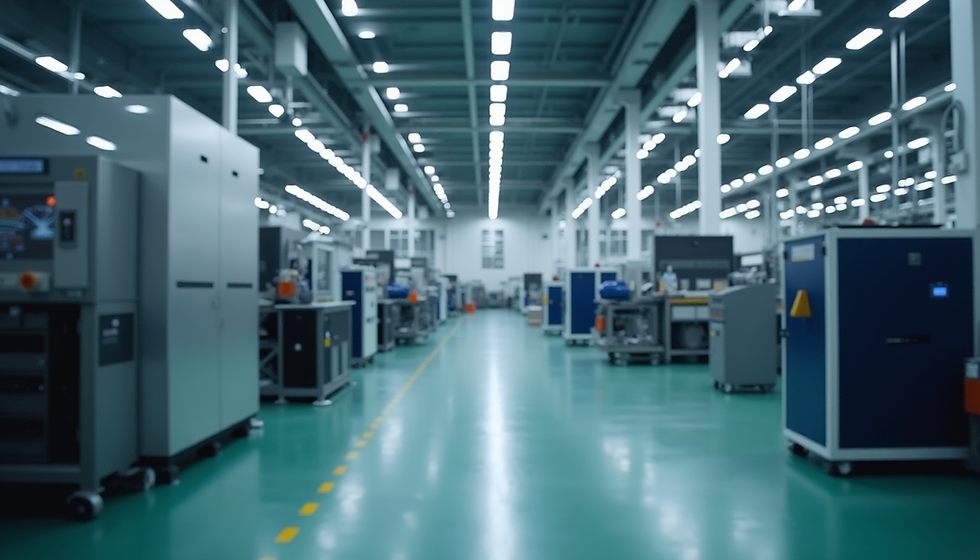AI-Powered Supply Chain Innovations for Manufacturers
- ram prasad
- Sep 19, 2025
- 4 min read
In today's fast-paced world, manufacturers face numerous challenges in managing their supply chains. From fluctuating demand to unexpected disruptions, the need for efficiency and adaptability has never been greater. Enter artificial intelligence (AI), a game-changer that is transforming how manufacturers operate. AI-powered innovations are not just buzzwords; they are practical tools that can streamline processes, reduce costs, and enhance decision-making.
In this blog post, we will explore how AI is reshaping supply chains for manufacturers. We will look at specific innovations, real-world examples, and the benefits they bring. By the end, you will have a clearer understanding of how to leverage AI in your supply chain strategy.
Understanding AI in Supply Chain Management
AI refers to the simulation of human intelligence in machines. In supply chain management, AI can analyze vast amounts of data, identify patterns, and make predictions. This capability allows manufacturers to optimize their operations in ways that were previously impossible.
Key AI Technologies in Supply Chains
Machine Learning: This technology enables systems to learn from data and improve over time. For example, machine learning algorithms can predict demand based on historical sales data.
Natural Language Processing (NLP): NLP helps machines understand human language. This can be useful for analyzing customer feedback or automating communication with suppliers.
Robotics and Automation: AI-powered robots can handle repetitive tasks, such as packing and sorting, freeing up human workers for more complex roles.
Predictive Analytics: This involves using data to forecast future trends. Predictive analytics can help manufacturers anticipate supply chain disruptions and adjust accordingly.
The Benefits of AI in Supply Chains
Implementing AI in supply chains offers several advantages:
Increased Efficiency: AI can automate routine tasks, reducing the time and effort required for manual processes.
Cost Reduction: By optimizing inventory levels and reducing waste, manufacturers can save money.
Improved Decision-Making: AI provides data-driven insights that help managers make informed decisions.
Enhanced Customer Satisfaction: With better demand forecasting, manufacturers can meet customer needs more effectively.
Real-World Examples of AI Innovations
Several manufacturers have successfully integrated AI into their supply chains. Here are a few notable examples:
1. Unilever
Unilever, a global consumer goods company, uses AI to optimize its supply chain. The company employs machine learning algorithms to analyze sales data and predict demand. This approach has led to a significant reduction in excess inventory and improved product availability.
2. Siemens
Siemens, a leading engineering company, has implemented AI in its manufacturing processes. The company uses predictive analytics to monitor equipment performance and predict maintenance needs. This proactive approach has minimized downtime and increased overall efficiency.
3. Amazon
Amazon is a pioneer in using AI for supply chain management. The company employs advanced algorithms to manage its vast inventory and optimize delivery routes. This technology allows Amazon to offer fast shipping while keeping costs low.
Challenges of Implementing AI
While the benefits of AI are clear, manufacturers may face challenges when implementing these technologies. Some common obstacles include:
Data Quality: AI relies on high-quality data. If the data is inaccurate or incomplete, the insights generated may be flawed.
Integration with Existing Systems: Manufacturers often use legacy systems that may not easily integrate with new AI technologies.
Skill Gaps: There may be a lack of skilled workers who can effectively implement and manage AI solutions.
Strategies for Successful AI Adoption
To overcome these challenges, manufacturers can adopt several strategies:
Invest in Data Management: Ensure that data is accurate, complete, and accessible. This may involve upgrading existing systems or implementing new data management tools.
Start Small: Begin with pilot projects to test AI solutions on a smaller scale. This approach allows manufacturers to learn and adapt before a full-scale rollout.
Train Employees: Provide training for employees to develop the necessary skills to work with AI technologies. This investment in human capital can pay off in the long run.
Collaborate with Experts: Partner with AI specialists or consultants who can provide guidance and support during the implementation process.
The Future of AI in Supply Chains
As technology continues to evolve, the role of AI in supply chains will only grow. Here are some trends to watch for in the coming years:
Increased Automation: More manufacturers will adopt AI-powered robots and automation tools to streamline operations.
Greater Personalization: AI will enable manufacturers to offer more personalized products and services based on customer preferences.
Sustainability Focus: AI can help manufacturers optimize their supply chains for sustainability, reducing waste and energy consumption.
Enhanced Collaboration: AI will facilitate better communication and collaboration between manufacturers, suppliers, and customers.
Conclusion: Embracing the AI Revolution
The integration of AI into supply chain management is not just a trend; it is a necessity for manufacturers looking to thrive in a competitive landscape. By embracing AI-powered innovations, manufacturers can enhance efficiency, reduce costs, and improve customer satisfaction.
As we move forward, it is essential for manufacturers to stay informed about the latest AI developments and be willing to adapt. The future of supply chains is bright, and those who harness the power of AI will be well-positioned for success.


.png)



Comments